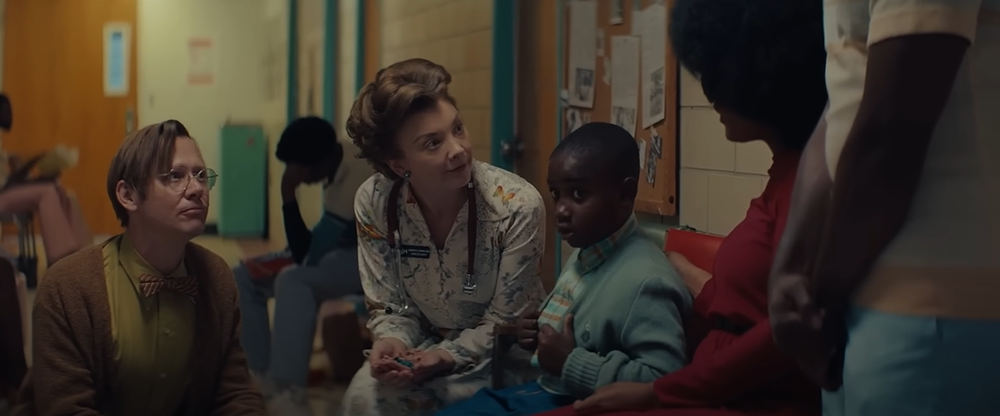Images courtesy of Blue Harbor Entertainment
AUDREY’S CHILDREN– 3 STARS
Throughout Audrey’s Children chronicling the medical breakthroughs in children’s cancer identification and treatment shepherded by Dr. Audrey Evans, the good doctor continuously referred to the young patients in her care as “her kids.” To her, no one was merely a medical file, room assignment, or case number. The tender label conveyed by notable Game of Thrones actress Natalie Dormer as Evans always landed with care and conviction—just as it should have. They count as simple things on a screenplay’s pages, but those uses of “her kids” and “my kids” in Audrey’s Children created tender connections that lifted the film and its historical source.
LESSON #1: ONCE THEY’RE MY KIDS, THEY’RE ALWAYS MY KIDS– Being able to use those labels so freely and honorably speaks to the bonds created by those tiers of professions that work closely with children. This very writer is a school teacher by day, and the mantra of “once they’re my kids, they’re always my kids” and similar variations are celebrated in everything from wellness articles to stickers. Like teachers, doctors specializing in children see youngsters at their most vulnerable and watch them grow in their care. The kids will ultimately age out and move on, and teachers and doctors will constantly see new faces. Nevertheless, they’ve imprinted themselves on each other with memories and impact.
Audrey’s Children champions such a scope of imprint and improvement made by Dr. Audrey Evans. She has an encyclopedia’s worth of firsts, titles, and accomplishments filling 97 years of life and 54 years as a working doctor. Those types of honors can often get movies made about famous and successful people, yet it’s the content of their character that makes the resulting movies that much better.
Eschewing the typical biopic route of a lengthy career parade, Audrey’s Children focused on a multi-year period of work in the 1970s that established Dr. Evans’ legend and regard. After earning her keep and building her expertise in the field of oncology with formative stops working in Edinburgh, Boston, and Chicago, Audrey was recruited by future U.S. Surgeon General C. Everett Coop (professional movie villain Clancy Brown, notching another encouraging role to balance his resume) to start a pediatric oncology section of the Children’s Hospital of Philadelphia.
She herself would specialize in neuroblastoma, a form of cancer striking immature nerve cells that was prevalent in infants and children.At the time, neuroblastoma had a 10% survival rate. Audrey theorized that current treatment methods were not aggressive enough to match the speed of the cancer, especially for her young patients. That urgency plunged Dr. Evans into exhausted research on lab mice to see if risky “combination chemotherapy” would be effective and to chart the stages by which neuroblastoma manifested in youths.
LESSON #2: THE DEDICATION OF A RESILIENT DOCTOR– The greatest opponent to our central figure’s initiative in Audrey’s Children was the calendar. Applications and the resulting funding was a shared and collaborative process at the Children’s Hospital of Philadelphia. Her patients did not have that time, so Dr. Evans circumvented the usual pecking order by securing outside pharmaceutical sponsorship on her own. Her resolve and intelligence garnered a split of ires and collegial support from her peers. She found two solid partners in Dr. Dan D’Angio (Westworld’s Jimmi Simpson, in a key part) and Dr. Brian Faust (Brandon Micheal Hall of TV’s The Mayor) who were willing to help her gather more data for her research.
LESSON #3: THE STAMINA OF RESILIENT PATIENTS– Dr. Audrey Evans did not confine her sympathetic efforts to hospital rooms. She took notice of the plight of the many parents and families camped in hopeful vigil in waiting rooms and hallways, embodied by up-and-coming actress Evelyn Giovine’s single mother Kate Watson. After opening her own home to Kate, Audrey sought to buy a vacant home to be a free boardinghouse for families with children in long-term medical care. In 1974, the dream made her the co-founder of the original Ronald McDonald House in Philadelphia, a charity model that would then spread around the world.
To its credit, veteran TV director Ami Canaan Mann shot the majority of Audrey’s Children right on locations in Philadelphia and Chester, Pennsylvania with superb set details from production designer Amber Unkle (TV’s Tires). Those weathered textures add charm to the period piece. Granted, compared to other medical-centered dramas that amp up their own kinds of manufactured peril, Audrey’s Children will not—nor should it really—be the most scintillating film of life-saving excitement. This film depicts the long game of gradual change where dialogue rife with medical lingo, mild inter-office subterfuge, data walls of taped cards, and stern talks in corridors and offices are its heights of drama. When those lulls occur, look to the greater good at work because you’re watching what turned a 10% survival rate to better than 80%.
As a film aiming for audience education and entertainment, Audrey’s Children hangs its hat—just like the good doctor did—on heart. Natalie Dormer admirably lionized her influential figure by conveying a commanding respect for the greater cause and handling the spotlight of being a woman looking for acceptance and professionalism during that less-than-friendly era. She brightened that spotlight with benevolence and vibrancy, aided by excellent hair work from Genyii Scott (Mean Girls) and dazzling vintage wardrobe selections by costume designer Sarah Maiorino (The Good Half). Even better for the sense of independence, no love interest was necessary.
Audrey’s Children chisels an important story into an extremely well-meaning film. Not all life-saving feats are glamorous and marked with crowds and cheers. Sometimes, all they are is a stabilized vital signs, hopeful test results to live longer, or a family that walks out the door of a hospital intact instead of grieving a loss. To enjoy and appreciate this very suitably PG-rated film is to watch an uncompromising woman taking risks to put in the diligent work to make a difference for, once again, “her kids.” Find that capacity to be invested in the same special type of heart.
LOGO DESIGNED BY MEENTS ILLUSTRATED (#1290)



